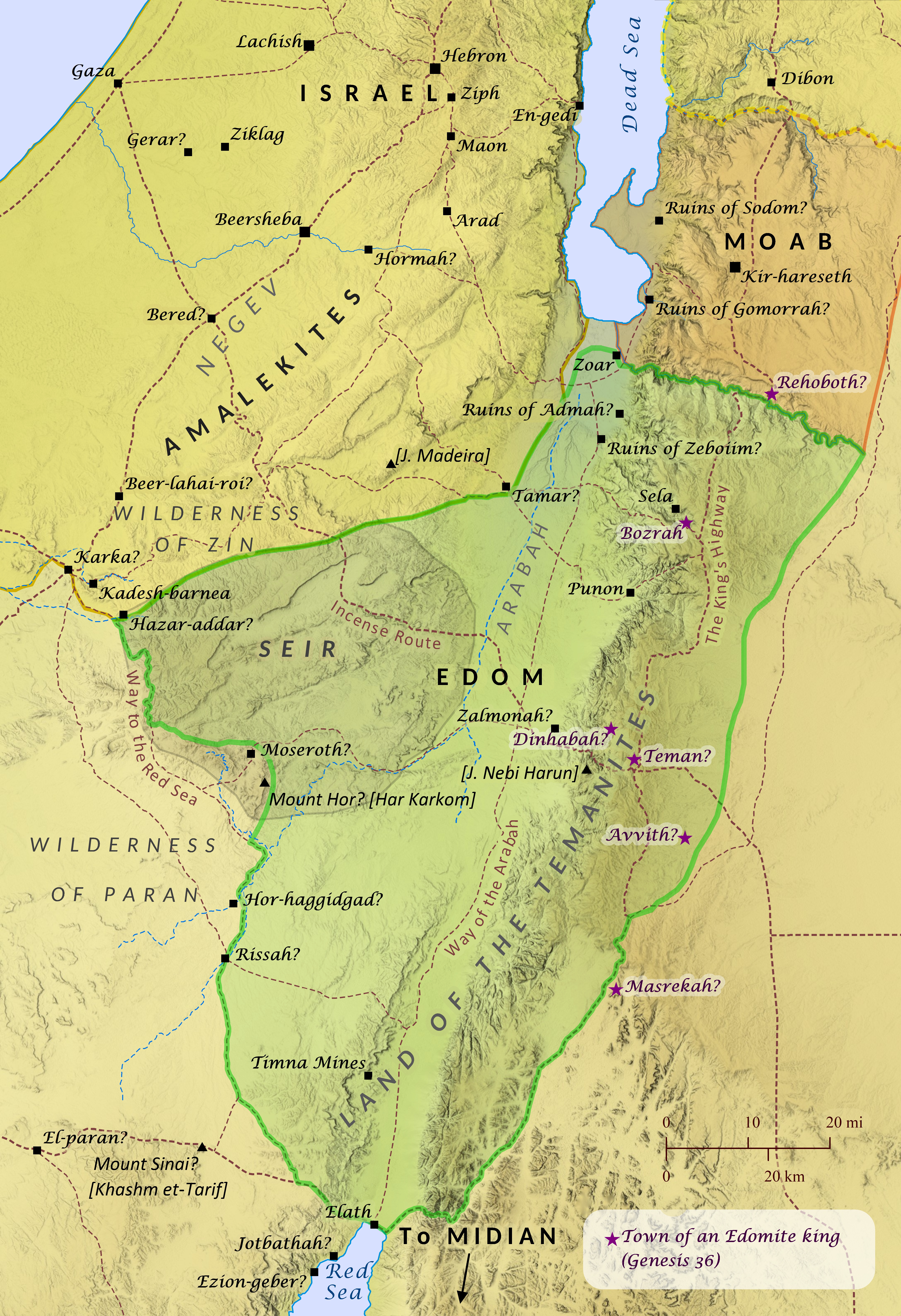BMM BibleMapper.com Maps:

Edom and the Land of Seir
While the location of Mount Sinai is arguably the most significant unresolved debate remaining in Bible geography, it is this author’s estimation that the borders of Edom and Seir (also called “Mount Seir” and “the highlands of Seir”) have actually led to a greater amount of confusion regarding where related events took place. This confusion stems primarily from a key misunderstanding widely held about Edom and Seir: that Seir was located either solely or primarily on the eastern side of the Arabah (the low valley dividing virtually all of Israel from northern end of the Jordan River to the city of Elath on the Red Sea). But this author is convinced that, prior to the later Old Testament, all biblical references to Seir regard it as a sub-region within the greater area of Edom, and it was located on the western side of the Arabah. To be clear, the biblical accounts consistently affirm that the nation of Edom (the descendants of Esau) occupied the eastern side of the Arabah and even had their own rulers before the Israelites had kings (Genesis 36), as shown on this map. But this area is not typically what is intended when the biblical writers use the term Seir. (A nearly exhaustive list of references to Seir as a geographical term includes: Genesis 14:6; 32-33; 36; Numbers 24:18; Deuteronomy 1:2, 44; 2:1-12, 22-29; 33:2; Joshua 11:17; 12:7; 24:4; Judges 5:4; 1 Chronicles 1:38; 4:42; 2 Chronicles 20:10-23; 25:11-14; Isaiah 21:11; Ezekiel 35:2-15.) Also, it should be noted that the assumption that Seir was located east of the Arabah is at least as old as the writings of Josephus (Ant., IV, iv, 7) immediately after the New Testament, for he seems to assume this. Yet, Josephus’s overall reliability regarding the location of the events of the wilderness wanderings (and thus Seir) is called into question by his misidentification of Mount Hor with Jebel Nebi Harun (see “The Israelites’ Journeys in the Wilderness” map), so it is very possible he was also mistaken about Seir. Similarly, though it is commonly concluded that the term Seir can be found in the name ash-Sharat, it should be noted that the Arabic term for the eastern mountains of Edom was likely applied to the region several hundred years after the close of the Old Testament era and the time of Josephus, so it is possible that the term Seir had long since shifted to the eastern mountains by this time. Also, while archeological data confirms that eastern Edom was populated with a settled civilization before western Edom, this data likely would not accurately reflect habitation by semi-nomadic peoples such as Esau and his earlier descendants, whose settlements would have been largely temporary and unlikely to be recovered. In terms of biblical evidence, however, several verses support and even seem to require that Seir be located on the western side of the Arabah (Deuteronomy 2:1; Joshua 12:7; 1 Chronicles 4:42-43; see also Joshua 15:1) and also that Seir was only a sub-region within the larger Edomite nation (Ezekiel 35:15). And while some verses seem ambiguous regarding the location of Seir, none of them offer compelling testimony that it should be located east of the Arabah. A few passages (for example, 2 Chronicles 25; Ezekiel 35 [though see v. 15]) seem at times to use the term Seir to refer to all of Edom, but they never use it to refer only to eastern Edom. Instead, they appear to use the term in a similar way that the biblical writers sometimes symbolically use the term Ephraim to refer to all the northern Israelite tribes (Isaiah 7-11; Jeremiah 31; Hosea 5-14; Zechariah 9-10), though it was widely understood that Ephraim only occupied a specific portion of tribal territory within the land of Israel. If the borders of Seir, however, are relocated west of the Arabah, as shown here at the time of Joshua’s allotment of Canaan, several related stories in the Bible make better sense. For example, the journeys of Jacob and Esau as they meet each other and part once again make the best sense if Esau was arriving from a location on the west side of the Jordan River (Genesis 32-33; also see “Jacob Returns to Canaan” and “Jacob Travels to Southern Canaan” maps). Likewise it is easiest to envision the Israelites skirting the land of Seir after turning back from Kadesh (Deuteronomy 2:1; see “The Israelites’ Journeys in the Wilderness” map) if Seir was located west of the Arabah. Joshua’s description of Judah’s southern border also makes the most sense if Seir (and thus Edom) was located west of the Arabah (Joshua 15:1). In the time of Hezekiah, a western location for Seir makes it easiest to envision a company of 500 Simeonites exterminating a remnant of Amalekites there and settling in their place (1 Chronicles 4:42-43; see “Hezekiah Strengthens Judah” map). Finally, the prophet Ezekiel cursed the Edomites for encroaching far north of Judah’s southern border after the Babylonians ravaged the land (Ezekiel 35), and this is easiest to envision if the Edomites already occupied land immediately south of Judah. And by way of extrapolation, if it is to be assumed that the Horites, who formerly inhabited Seir (Deuteronomy 2:12), took their name from Mount Hor or that Mount Hor was named after them, then it is likely that this peak where Aaron died was located somewhere within the region of Seir as it is shown here (see “The Israelites’ Journeys in the Wilderness” map).

